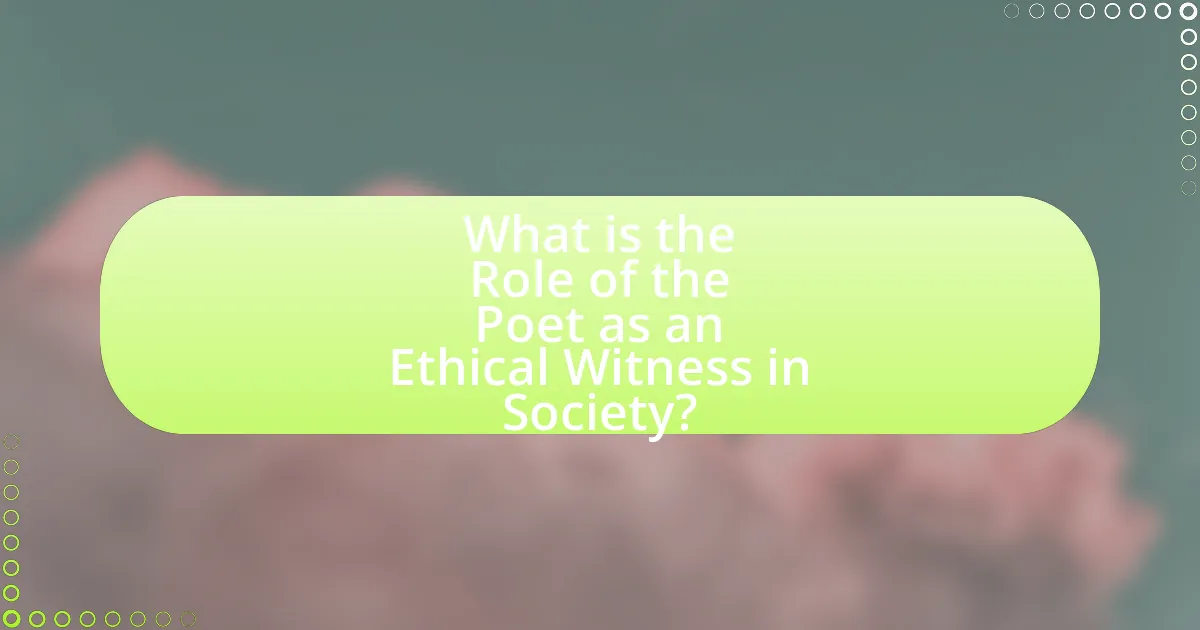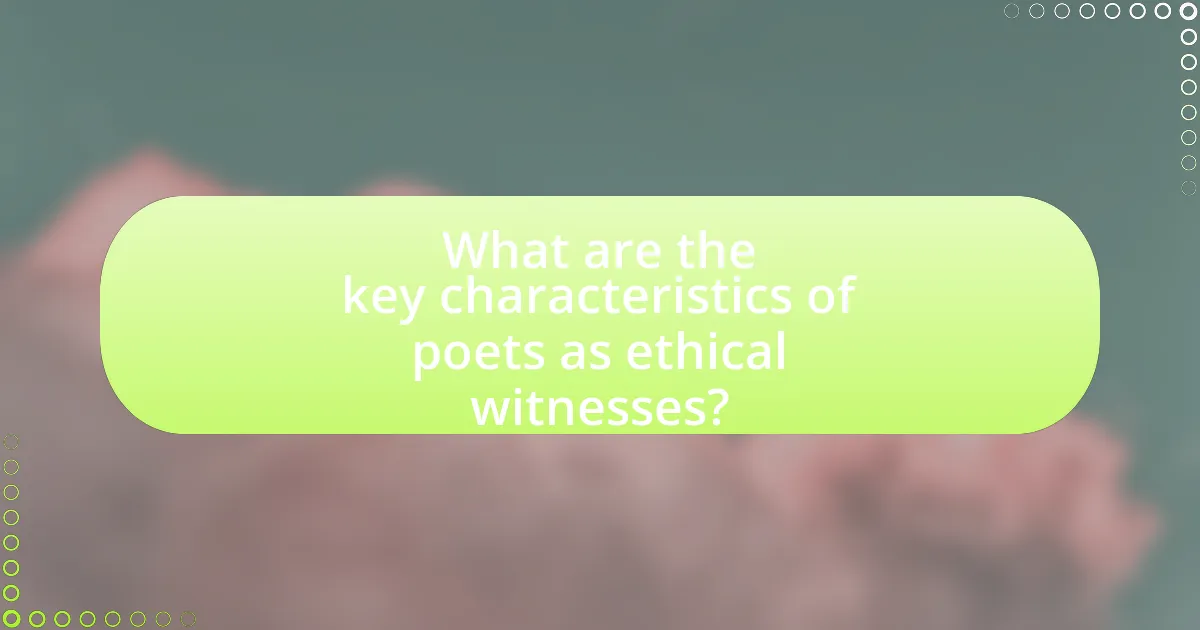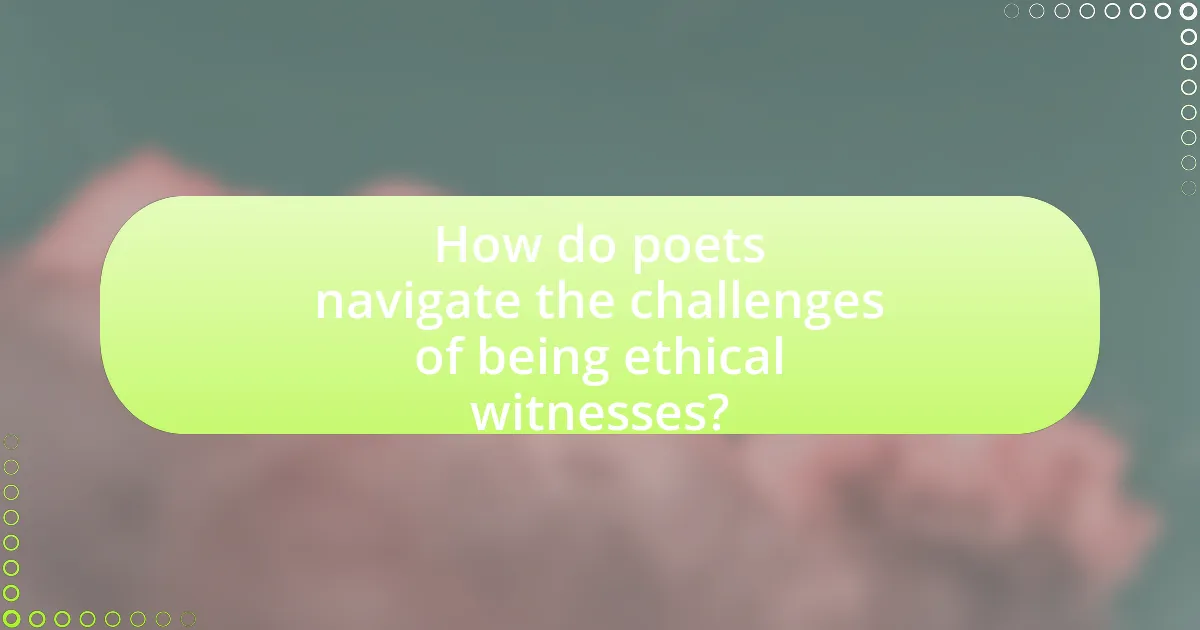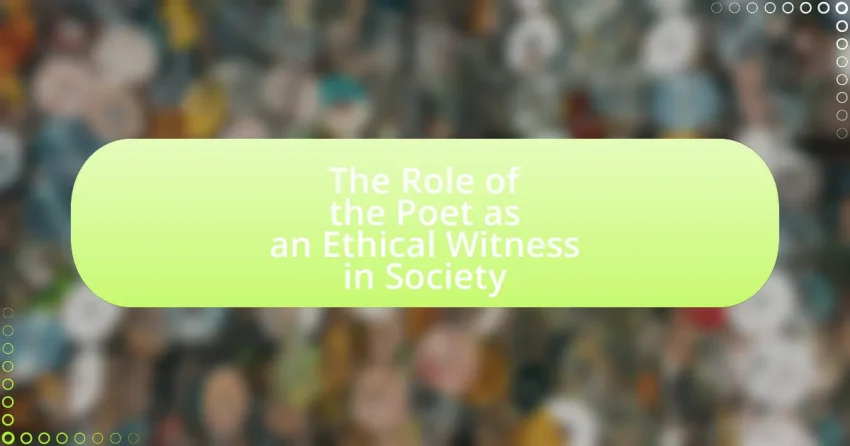The article examines the role of poets as ethical witnesses in society, emphasizing their responsibility to articulate truths about human experiences and highlight social injustices. It discusses how poets like Langston Hughes and Maya Angelou have historically addressed issues of race and identity, influencing public discourse and fostering empathy. The article also explores the characteristics that define poets as ethical witnesses, the techniques they use to engage with ethical dilemmas, and the impact of their work on social change. Additionally, it addresses the challenges poets face in maintaining integrity while navigating societal norms and expectations.

What is the Role of the Poet as an Ethical Witness in Society?
The role of the poet as an ethical witness in society is to articulate truths about human experience, often highlighting social injustices and moral dilemmas. Poets serve as observers and commentators, using their craft to reflect societal values and provoke critical thought. For instance, poets like Langston Hughes and Maya Angelou have addressed issues of race and identity, influencing public discourse and fostering empathy. Their works often resonate with historical contexts, such as the Harlem Renaissance, where poetry became a vehicle for social change and awareness. This ethical witnessing empowers poets to challenge the status quo and inspire action, making their contributions vital to societal progress.
How do poets serve as ethical witnesses?
Poets serve as ethical witnesses by articulating the truths of human experience, often highlighting social injustices and moral dilemmas. Through their work, poets reflect the realities of marginalized voices and challenge societal norms, thereby fostering empathy and awareness among their audience. For instance, poets like Maya Angelou and Langston Hughes have used their poetry to confront racism and inequality, effectively documenting the struggles of their communities. This role as ethical witnesses is crucial in promoting social change, as their words resonate emotionally and provoke critical thought, encouraging readers to engage with ethical issues in society.
What responsibilities do poets have in society?
Poets have the responsibility to reflect societal truths and challenge injustices through their work. By articulating the human experience, poets serve as ethical witnesses, capturing the complexities of life and prompting critical reflection among their audience. Historical examples, such as the works of Langston Hughes during the Harlem Renaissance, illustrate how poetry can address social issues like racism and inequality, influencing public consciousness and inspiring change. Thus, poets play a crucial role in advocating for justice and fostering empathy within society.
How do poets interpret and reflect societal issues?
Poets interpret and reflect societal issues by using their craft to articulate the complexities of human experiences and social injustices. Through various poetic forms, they convey emotions, critique societal norms, and raise awareness about pressing issues such as inequality, war, and environmental degradation. For instance, poets like Langston Hughes and Maya Angelou have addressed racial discrimination and identity, using personal narratives to highlight broader societal struggles. Their works serve as a mirror to society, prompting readers to engage with and reflect on these critical issues, thereby fostering empathy and understanding.
Why is the concept of ethical witnessing important for poets?
The concept of ethical witnessing is important for poets because it enables them to authentically engage with and represent the experiences of marginalized voices. By acting as ethical witnesses, poets can illuminate social injustices and foster empathy, thereby contributing to societal awareness and change. This role is supported by the historical context of poetry as a medium for social commentary, where poets like Langston Hughes and Maya Angelou used their work to address racial inequality and human rights issues, demonstrating the power of poetry to influence public consciousness and inspire action.
What historical contexts have shaped the role of poets as ethical witnesses?
The role of poets as ethical witnesses has been shaped by various historical contexts, including periods of social upheaval, war, and cultural transformation. For instance, during the Romantic era in the late 18th and early 19th centuries, poets like William Wordsworth and Samuel Taylor Coleridge emphasized the importance of individual experience and moral responsibility in response to the Industrial Revolution’s dehumanizing effects. Similarly, the World Wars prompted poets such as Wilfred Owen and W.H. Auden to confront the horrors of conflict, using their work to bear witness to human suffering and advocate for peace. The Civil Rights Movement in the 1960s also saw poets like Maya Angelou and Gwendolyn Brooks address social injustices, thereby reinforcing their role as moral commentators. These contexts illustrate how poets have historically responded to societal challenges, using their art to reflect ethical concerns and inspire change.
How does ethical witnessing influence poetic expression?
Ethical witnessing significantly influences poetic expression by compelling poets to engage with social injustices and human experiences authentically. This engagement fosters a sense of responsibility in poets to represent marginalized voices and convey truths that may otherwise remain unheard. For instance, poets like Audre Lorde and Langston Hughes utilized their work to address racial and gender inequalities, illustrating how ethical witnessing can shape the themes and narratives within poetry. Their writings serve as a testament to the power of poetry as a medium for social commentary, demonstrating that ethical witnessing not only enriches poetic expression but also serves as a catalyst for societal change.

What are the key characteristics of poets as ethical witnesses?
Poets as ethical witnesses possess key characteristics such as empathy, social awareness, and the ability to articulate complex truths. Empathy allows poets to connect deeply with the experiences of others, enabling them to convey the emotional weight of societal issues. Social awareness equips poets to recognize injustices and cultural dynamics, which they reflect in their work. Furthermore, their skill in articulating complex truths helps to illuminate hidden narratives and challenge dominant discourses, making their voices crucial in advocating for marginalized perspectives. These characteristics are evident in the works of poets like Maya Angelou and Pablo Neruda, who addressed social injustices and human rights through their poetry, demonstrating the profound impact of their ethical witness.
How do poets convey truth and authenticity in their work?
Poets convey truth and authenticity in their work through the use of personal experience, vivid imagery, and emotional resonance. By drawing from their own lives, poets create relatable narratives that reflect genuine human experiences, allowing readers to connect deeply with the themes presented. For instance, poets like Maya Angelou and Langston Hughes often incorporate their own struggles and societal observations, which enhances the authenticity of their messages. Additionally, the use of specific, sensory language helps to paint a clear picture of emotions and situations, making the truth more palpable. This technique not only engages the reader but also reinforces the poet’s credibility as an observer of reality.
What techniques do poets use to engage with ethical dilemmas?
Poets engage with ethical dilemmas through techniques such as imagery, metaphor, and narrative voice. Imagery allows poets to create vivid representations of moral conflicts, making abstract ethical issues tangible and relatable for readers. For instance, in “The Waste Land,” T.S. Eliot uses stark imagery to highlight the disillusionment of post-war society, prompting readers to reflect on the ethical implications of their reality. Metaphor serves to draw parallels between personal experiences and broader societal issues, as seen in the works of poets like Audre Lorde, who uses metaphor to address themes of oppression and identity. Additionally, the choice of narrative voice can influence how ethical dilemmas are perceived; a first-person perspective can evoke empathy and personal connection, as demonstrated in Maya Angelou’s poetry, which often reflects her own struggles against injustice. These techniques collectively enable poets to provoke thought and discussion around complex ethical issues, reinforcing their role as ethical witnesses in society.
How does personal experience shape a poet’s ethical perspective?
Personal experience significantly shapes a poet’s ethical perspective by providing the emotional and contextual foundation from which they draw their insights. This foundation allows poets to reflect on their lived experiences, such as trauma, joy, or social injustice, which informs their understanding of moral complexities. For instance, poets like Maya Angelou and Langston Hughes used their personal histories of oppression and resilience to address broader societal issues, thereby influencing their ethical viewpoints. Their works illustrate how individual narratives can resonate with collective experiences, reinforcing the idea that personal experience is a crucial element in shaping a poet’s ethical stance.
What impact do poets have on social change?
Poets significantly influence social change by articulating societal issues and inspiring collective action. Through their work, poets often highlight injustices, provoke thought, and evoke emotions that can mobilize communities. For instance, the poetry of Langston Hughes during the Harlem Renaissance addressed racial inequality and inspired the Civil Rights Movement, demonstrating how poetic expression can serve as a catalyst for social awareness and reform. Additionally, contemporary poets like Amanda Gorman have used their platforms to address issues such as climate change and social justice, further illustrating the power of poetry to resonate with and galvanize public sentiment.
How can poetry inspire activism and awareness?
Poetry can inspire activism and awareness by articulating social injustices and evoking emotional responses that mobilize individuals toward action. Through vivid imagery and powerful language, poets can highlight issues such as inequality, discrimination, and environmental degradation, making these topics relatable and urgent. For instance, the works of poets like Maya Angelou and Langston Hughes have historically galvanized movements for civil rights by capturing the struggles and aspirations of marginalized communities. Their poetry not only raises awareness but also fosters a sense of solidarity and urgency, prompting readers to engage in activism.
What examples exist of poets influencing public opinion?
Poets have significantly influenced public opinion through their works, with notable examples including Walt Whitman, whose poem “Leaves of Grass” championed democracy and individualism, impacting American identity and social reform. Another example is Langston Hughes, whose poetry during the Harlem Renaissance highlighted racial injustice and inspired the civil rights movement, shaping public discourse on race in America. Additionally, Maya Angelou’s “Still I Rise” empowered marginalized voices and became a rallying cry for equality, influencing societal attitudes toward race and gender. These poets used their art to reflect societal issues, mobilize communities, and provoke thought, demonstrating the powerful role of poetry in shaping public opinion.

How do poets navigate the challenges of being ethical witnesses?
Poets navigate the challenges of being ethical witnesses by employing a combination of personal reflection, social awareness, and artistic integrity. They often draw from their own experiences and observations to authentically represent the voices and stories of marginalized communities, ensuring that their work resonates with truth and empathy. For instance, poets like Claudia Rankine address racial injustice and personal trauma in their works, using language that evokes emotional responses while remaining grounded in reality. This approach not only highlights the ethical responsibility of poets to accurately portray the human experience but also fosters a deeper understanding of societal issues among their audience. By balancing artistic expression with ethical considerations, poets contribute to social discourse and advocate for change.
What obstacles do poets face in their role as ethical witnesses?
Poets face significant obstacles in their role as ethical witnesses, primarily including societal resistance, censorship, and the challenge of conveying complex truths. Societal resistance often manifests as a lack of acceptance for the poet’s perspective, especially when it challenges dominant narratives or power structures. Censorship can limit a poet’s ability to express their observations and critiques, as seen in various historical contexts where governments or institutions suppress dissenting voices. Additionally, the challenge of conveying complex truths arises from the need to distill intricate social issues into accessible language, which can dilute the intended message or lead to misinterpretation. These obstacles hinder poets’ effectiveness in fulfilling their role as ethical witnesses, as they strive to illuminate injustices and provoke critical thought within society.
How do societal norms affect a poet’s ability to speak out?
Societal norms significantly restrict a poet’s ability to speak out by imposing expectations on language, themes, and subject matter. These norms can lead to censorship, where poets may face backlash or ostracism for challenging prevailing beliefs or addressing taboo topics. For instance, poets in authoritarian regimes often experience persecution for expressing dissenting views, as seen in the cases of writers like Pablo Neruda in Chile, who faced government scrutiny for his political stance. Additionally, societal norms can create a culture of conformity, discouraging poets from exploring innovative or controversial ideas, thereby limiting the diversity of voices in literature.
What risks do poets take when addressing controversial topics?
Poets take significant risks when addressing controversial topics, including potential backlash, censorship, and personal safety threats. By tackling sensitive issues such as politics, social justice, or identity, poets may face public criticism or alienation from certain audiences. Historical examples include the censorship of works by poets like Pablo Neruda, whose politically charged poetry faced suppression under authoritarian regimes. Additionally, poets may encounter legal repercussions, as seen in cases where their work challenges societal norms or laws. These risks highlight the delicate balance poets must navigate between artistic expression and societal response.
How can poets maintain integrity while addressing complex issues?
Poets can maintain integrity while addressing complex issues by grounding their work in authenticity and personal experience. This approach ensures that their perspectives are genuine and reflective of their true beliefs, which fosters trust with their audience. For instance, poets like Audre Lorde and Langston Hughes have effectively tackled social injustices by drawing from their own lived experiences, thereby enhancing the credibility of their messages. Additionally, poets can uphold integrity by engaging in thorough research and understanding the nuances of the issues they address, which allows them to present informed viewpoints rather than oversimplified narratives. This commitment to depth and accuracy not only enriches their poetry but also reinforces their role as ethical witnesses in society.
What strategies can poets employ to balance personal beliefs and public expectations?
Poets can employ strategies such as thematic ambiguity, audience engagement, and adaptive language to balance personal beliefs with public expectations. Thematic ambiguity allows poets to express their views while leaving room for interpretation, enabling diverse audiences to connect with the work without feeling alienated. Audience engagement involves actively seeking feedback and understanding the perspectives of readers, which can guide poets in crafting their messages to resonate more broadly. Adaptive language refers to the use of accessible and relatable diction that conveys personal beliefs while appealing to public sensibilities. These strategies are supported by the fact that poets like Maya Angelou and Langston Hughes successfully navigated their personal convictions and societal expectations, demonstrating the effectiveness of such approaches in their impactful works.
How can poets ensure their work remains relevant and impactful?
Poets can ensure their work remains relevant and impactful by engaging with contemporary social issues and reflecting the diverse experiences of society. By addressing themes such as inequality, identity, and environmental concerns, poets resonate with current audiences and foster connection. Historical examples, such as the works of Maya Angelou and Langston Hughes, demonstrate how poetry can capture the zeitgeist and provoke thought, making their messages timeless and influential. Additionally, utilizing modern platforms, such as social media, allows poets to reach broader audiences and engage in real-time conversations, further enhancing the relevance of their work.
What practical tips can poets follow to enhance their role as ethical witnesses?
Poets can enhance their role as ethical witnesses by actively engaging with their communities and addressing social injustices through their work. This involves researching and understanding the issues faced by marginalized groups, allowing poets to authentically represent their experiences. Additionally, poets should prioritize listening to the voices of those they write about, ensuring that their poetry reflects genuine perspectives rather than assumptions. Collaborating with activists and organizations can also provide poets with deeper insights and amplify the messages they wish to convey. By participating in workshops and discussions focused on ethics in art, poets can refine their approach to storytelling, ensuring it is responsible and impactful.
How can poets effectively research and understand the issues they address?
Poets can effectively research and understand the issues they address by engaging in comprehensive literature reviews, conducting interviews, and immersing themselves in the communities they write about. This multifaceted approach allows poets to gather diverse perspectives and insights, ensuring their work reflects the complexities of the issues at hand. For instance, a poet addressing social justice may read scholarly articles, historical texts, and contemporary news reports to grasp the nuances of the topic. Additionally, interviewing activists or community members provides firsthand accounts that enrich the poet’s understanding. Immersing in the community through participation in events or discussions further deepens their connection to the subject matter, leading to more authentic and impactful poetry.
What resources are available for poets to develop their ethical perspectives?
Poets can develop their ethical perspectives through various resources, including workshops, literary journals, and online platforms focused on ethical writing. Workshops, such as those offered by organizations like the Poetry Foundation, provide structured environments for poets to explore ethical themes and engage in discussions about moral responsibility in their work. Literary journals, such as “The Kenyon Review” and “Poetry Magazine,” often publish essays and poems that tackle ethical issues, serving as both inspiration and a means to understand diverse viewpoints. Online platforms, including social media groups and forums dedicated to poetry, facilitate conversations about ethics in writing, allowing poets to share experiences and insights. These resources collectively foster a deeper understanding of the ethical implications of poetry in society.
